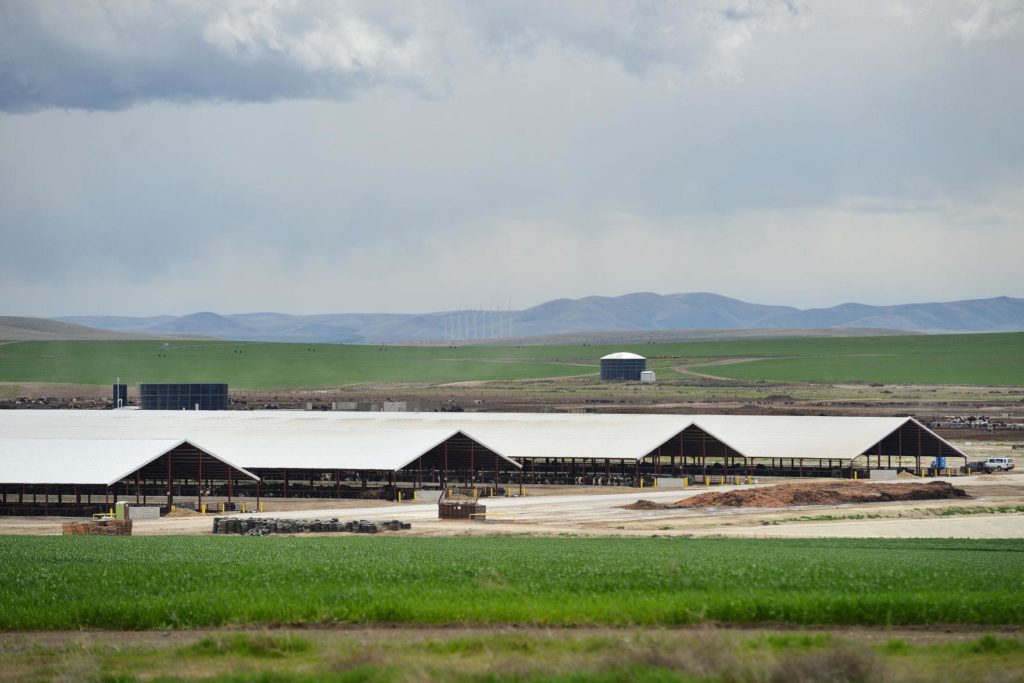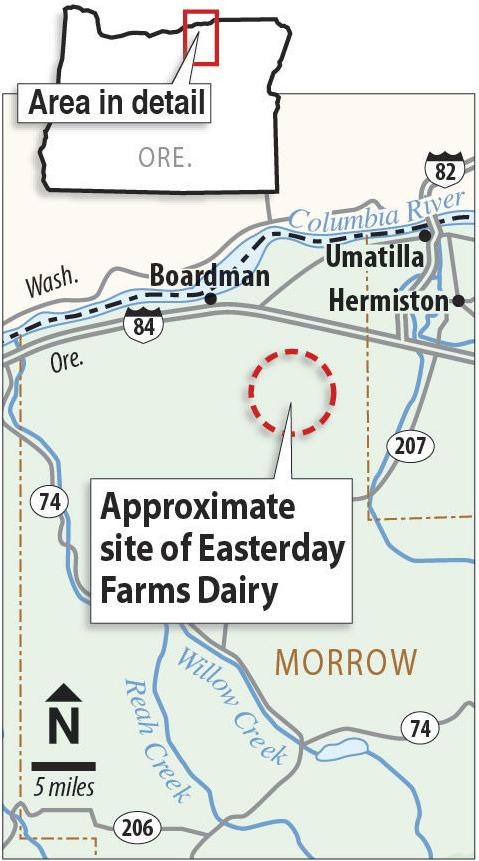By Bryce Dole | Aug. 26, 2021 | East Oregonian
A coalition of environmental groups is calling on Gov. Kate Brown to reject a permit application for the proposed Easterday dairy in Boardman.
In a press conference on Aug. 24, leaders from the Stand Up to Factory Farms Coalition said the dairy will exacerbate a variety of environmental problems already plaguing the region and hasten climate change.
“These problems are likely to worsen if the state issues a permit for this mega-dairy,” said Mackenzie Aime, the Oregon organizer with Food and Water Watch and Food and Water Action. “All mega-dairies pose a threat to Oregon’s public health and environment.”
The groups submitted a petition with more than 1,400 signatures to Brown on Aug. 24, demanding the governor direct state agencies to deny a confined animal feeding operation permit, or CAFO, that Cole Easterday seeks.
Easterday is the son of Cody Easterday, who pleaded guilty to felony wire fraud earlier this year in a “ghost cattle” scheme where he defrauded Tyson Foods by selling more than 200,000 animals that did not exist. He agreed to pay $220 million in restitution and faces up to 20 years in prison. His sentencing in federal court is scheduled in October.
In 2019, the Easterdays acquired the property from Greg te Velde, the former owner of Lost Valley Farms. That dairy closed less than a year after it opened due to repeated environmental violations, forcing te Velde into bankruptcy.
Cody Easterday’s sons now own the family’s dairy business, Easterday Dairy LLC. In addition to his legal troubles, the family’s Easterday Farms and Easterday Ranches have filed for bankruptcy.
“Oregon officials have long asserted that the hundreds of permit violations at Lost Valley Farms were simply because Lost Valley’s owner was one bad actor,” Aime said. “But the Easterday debacle has shown that that is blatantly false.”
Cole Easterday declined to comment for this story.
Environmentalists Decry Dairy Prospects
The environmental groups claim the dairy would use up already scarce groundwater, pose a threat to the region’s air, water and wildlife and worsen the effects of climate change.
Brian Posewitz, a staff attorney with WaterWatch Oregon and Humane Voters Oregon, said the state should deny the dairy’s application to protect the region’s water supply and animal welfare.
He said the proposed dairy would use millions of gallons of water from the Columbia River and from groundwater aquifers, which would threaten fish populations and intensify drought conditions. He said the dairy’s water use would potentially exceed that of the city of Bend.
The large amount of cow manure generated by the dairy also threatens to contaminate the water supply in nearby communities, he and other coalition members claimed.
The state agriculture department has issued a water quality advisory for the property after tests showed soil nitrate levels could potentially contaminate groundwater. Cody Easterday has agreed to clean up the property under state supervision.
Lastly, Posewitz said the animals would be living in crowded, inhumane conditions.
“The cows get crammed into overcrowded barns, rarely if ever get to graze in a pasture, have their calves taken from them right after birth, and get sent to slaughter as soon as they become unproductive for milk,” he said.
The dairy plans to have 28,300 animals total. Environmentalists say those animals would produce large amounts of methane, one of the key components that hastens climate change.
The Intergovernmental Panel on Climate Change, a body of scientists convened by the United Nations, said in its annual report that methane has made a huge contribution to global warming. The short-lived gas, the study suggests, accounts for approximately 30 to 50 percent of the current rise in temperature.
“Livestock production has become the leading source of methane gas in Oregon,” Amy van Saun, a senior attorney with the Center for Food Safety, said in the press conference.
This summer’s wildfires, deadly heatwaves and drought are examples of how climate change is already impacting the state, van Saun said. She said the methane emitted from the dairy’s cows and manure lagoons would increase these risks while the dairy’s technology won’t be able to capture the emissions.
“Oregon deserves real, transformative climate solutions that benefit the communities that are hardest hit by the climate crisis,” van Saun said. “If we want to lead in climate crisis mitigation, we need to reduce this unnecessary source of methane first. Mega-dairies have no place in a clean Oregon and so we must say no to any further sources of water, air and climate pollution, like the Easterday mega-dairy.”
This article originally appeared in the East Oregonian on Aug. 26, 2021.


